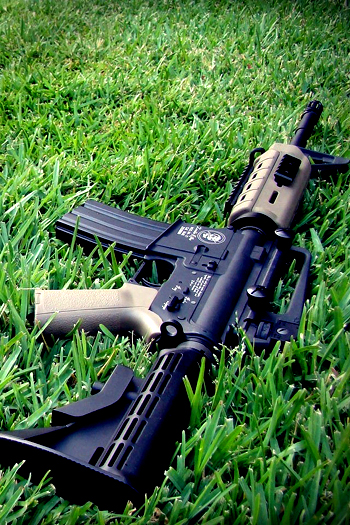When Max Weber formalized his definition of state, he was asking to stir up trouble. Luckily, he wasn’t around long enough to bear the heat from peace-touting, anti-war idealists of the sixties. For a polity to be considered a state, Weber postulated, it must hold a legitimate monopoly on violence. In other words, the state must retain exclusive control over violence and its use of force must be seen as legitimate to the people.

Without legitimacy, a monopoly on violence can go awry as it often does in authoritarian dictatorships. Such regimes struggle to initially possess any legitimacy and if they do eventually acquire it, they still have difficulty maintaining proprietorship without charisma, traditional authority, or a legal-rational basis to support their monopoly. The result is state-sponsored violence that can lead to genocideor the entire collapse of the state.
One need not dabble into political theory or burn a draft card to wonder why Weber’s definition posits violence of all things as the foundation of a state— why a government needs to have exclusive control over weapons, military systems, and violence in order to govern effectively. It seems like an asinine point for Weber to make.
That’s the premise of Peter van Uhm’s argument though. The former Chief of the Netherlands Defence Staff makes a case for guns and, at one point, even stands in front of an audience with his assault rifle. His words exactly? “The gun may be one of the most important instruments of peace and stability that we have in this world.” This talk might have a fair share of anti-NRA lobbyists writhing in pain, along with a handful of anti-war Berkeley students, but van Uhm’s talk isn’t about the glorification of a highly militarized country or an appeal to keep troops in Afghanistan. Hear him out.
In the sphere of foreign policy, the thought of “pushing humanity forward” often accompanies images of civilized societies with successful public diplomacy initiatives and neighboring countries at peace with each other. Discussions on societal progression rarely ever include guns. However, Van Uhm adamantly defends military weaponry – and essentially the existence of armed forces – as necessary guardians of peace. This is specifically because he has the ethos of service personnel. The sense of duty and responsibility isn’t from the glossy pages of military service pamphlets. Peter Van Uhm became the highest ranking military official in the Netherlands the same day he lost his son, a young sergeant killed by a roadside bomb in the southern province of Afghanistan. The man clearly understands the effects of war.
Let’s broaden the scope of this idea. Van Uhm’s message isn’t just about guns or a legitimate monopoly on violence though. It’s really about appreciating the warrior ethos. Consider this.
Robert Plutchik’s circumplex model of emotions maps out adaptive behavior, from the primordial emotions developed early on for survival (anger, fear, sadness, disgust, surprise, anticipation, trust, jpy) to the secondary, more complex emotions created when primary emotions come together. It explains how anger and disgust can breed contempt while a combination of anger and anticipation creates aggressiveness. It also explains the wide range of emotions felt and the level of intensity each emotion can have (i.e. from annoyance to anger to rage or from apprehension to fear to terror). From that understanding of human capacity, anger will always exist, along with its neighboring emotions: rage, loathing, disgust, aggression, annoyance. Idealists will say that one day violence will cease to exist. But “these same individuals would be enraged and would call for “heads to roll” if they found out that the airbags in their cars were defective, or that the fire extinguisher and fire sprinklers in their kids’ school did not work” (Grossman). That’s called denial, ladies and gentlemen.
Emotions are not in and of themselves vices. At some point or another, every human being will experience the range of emotions Plutchik laid out in his model. It’s a matter of how raw emotion is controlled and when physical strength is used. Like the formation of a state, the formation of the individuals ruling and protecting the state is just as crucial to the survival of a polity. Warriors, soldiers, and real fighters will attest to this. Authoritarian dictators, however, get the timing wrong ten out of ten times. Somewhere along the path to power, these malignant narcissists end up projecting their patienthood onto society. True fighters don’t arm themselves with guns, knives, or dangerous skill sets for the glory that those instruments bring or for demonstrations of power. They, like Peter van Uhm, have violence well under control.
So here’s to the men and women who have been stirred to anger by injustice and have chosen to do good by their country— Happy Veterans Day.
“If you have no capacity for violence then you are a healthy productive citizen, a sheep. If you have a capacity for violence and no empathy for your fellow citizens, then you have defined an aggressive sociopath, a wolf. But what if you have a capacity for violence, and a deep love for your fellow citizens? What do you have then? A sheepdog, a warrior, someone who is walking the hero’s path. Someone who can walk into the heart of darkness, into the universal human phobia, and walk out unscathed.” – Lt. Col. Grossman
By: Dy Phi



Leave a Reply